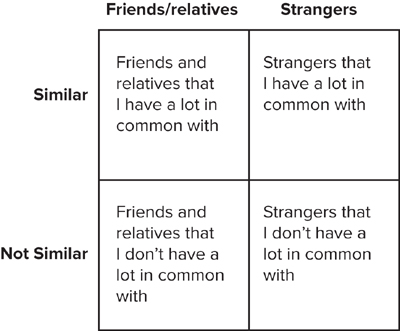83. The Brain Responds Uniquely to People You Know Personally
Your Uncle Arden invites you over to watch the World Cup and tells you to bring some friends. When you get there, you see several people you know (relatives and friends of relatives) and some you don’t know. It’s a lively bunch, and over food and the game on TV, lots of topics are covered, including soccer and politics. As you would expect, you have similar opinions to some of your friends and relatives, and you disagree with some of them. You actually have more in common, in terms of soccer and politics, with some of the strangers than you have with some of your friends and relatives. When it comes to the people in the room, you have essentially four possible connections, as shown in Figure 83.1.
Figure 83.1. The four possible connections with the people at the World Cup party
The questions that Fenna Krienen (2010) conducted research on are these: Does your brain react differently to these four combinations? Do you make judgments about other people based on how similar they are to you? Or is it more important that they be close to you—either a close friend or a relative? And if there are differences, will they show up on fMRI brain scans? When you think about people that you don’t know but that you feel similar to, do the same brain regions light up as though you were connected to them through kinship or previous friendship?
Krienen and her team tested these theories. They found that when people answered questions about friends, whether or not they felt they were similar to their friends, the medial prefrontal cortex (MPFC) was active. The MPFC is the part of the brain that perceives value and regulates social behavior. When people thought about others that they didn’t know but had common interests with, the MPFC was not active.
Present to Friends, Not Strangers
The implication of Krienen’s research is that your presentation will be more influential and better received if you are giving it to friends rather than to strangers. Anything you can do before your talk to try to get to know your audience is time well spent. If it is a small group, you might be able to meet with them in person or by phone before the actual presentation begins. If you are speaking to a large group, see if you can greet some people as they come in the door, or walk around and introduce yourself to the people who arrive early.
![]() Facebook vs. Twitter and the MPFC
Facebook vs. Twitter and the MPFC
Jonah Lehrer (2010) writes about the difference between Facebook and Twitter. He says that Facebook is about friends and relatives that you know well, even if you don’t think similarly about everything. Facebook activates the MPFC. Twitter is more about helping you connect to people you don’t already know.

